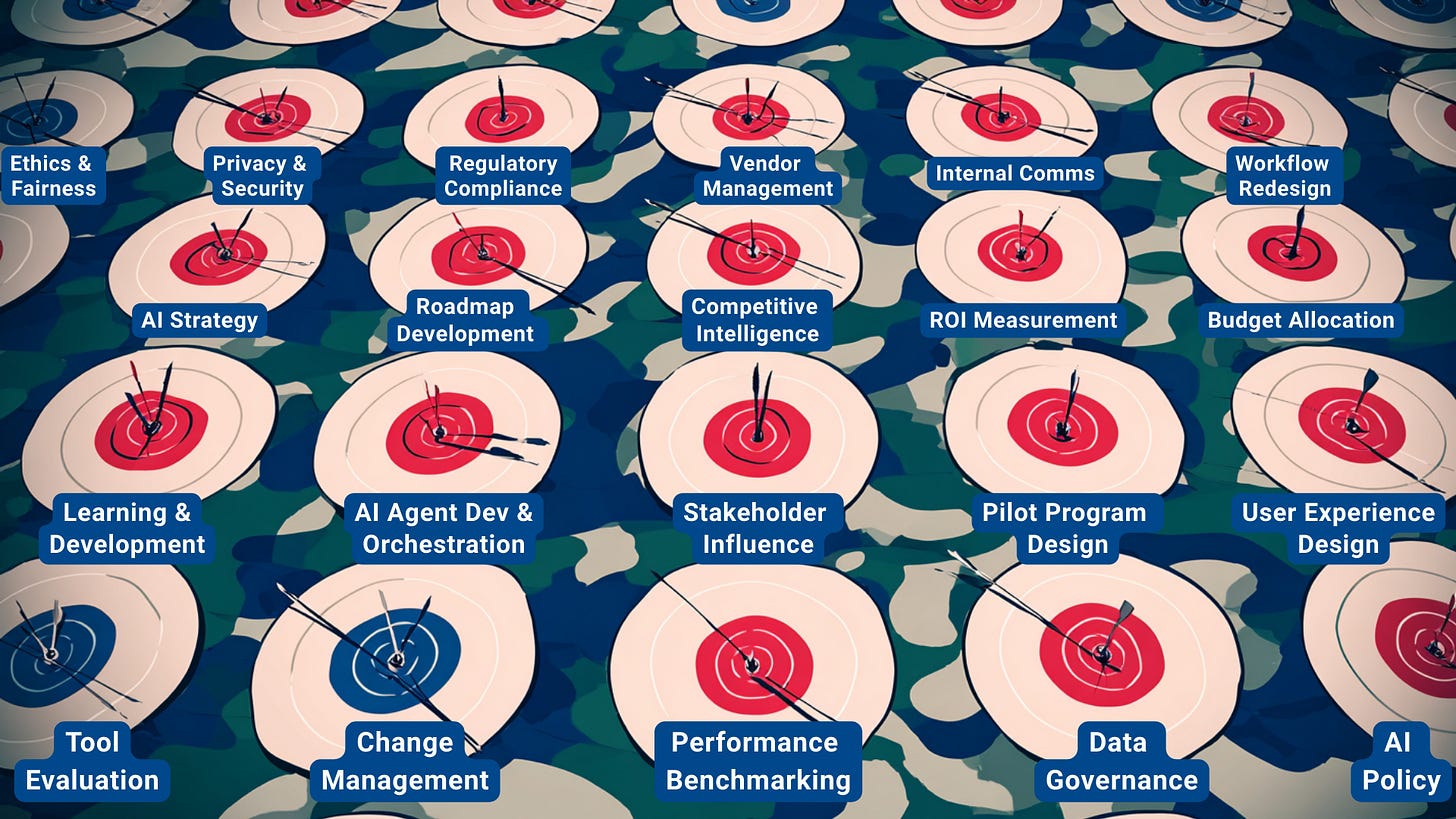AI Needs Teams, Not Heroes
The board is pressing for AI strategy. Your pilots aren't scaling. Different departments are buying overlapping tools without talking to each other. Employees complain the AI solutions slow them down instead of helping. Meanwhile, your leadership team is anxious and you’re getting reports of active employee sabotage.
You need to choose the right AI tools and roll them out coherently across your organization. Meanwhile, competitors are serving customers better and more cost-effectively.
You've likely debated its organizational home; IT for technical integration, Operations for process optimization, L&D for skills transformation and adoption, HR for workforce strategy. Each has relevant expertise, but AI transformation spans all these domains.
A natural response might be to hire a senior AI executive to create that capability and coordinate everything.
You're considering a VP of AI role with serious requirements: PhD preferred, strategic vision essential, change management expertise required. Salary range: $300K+ to attract top talent who can assess your landscape, make strategic decisions, and drive company-wide transformation.
Real Companies, Real Challenges
Disney's recent VP, Collaboration Technology & AI posting may show what you're thinking - someone to oversee Microsoft Copilot deployment, develop their "DisneyGPT" platform, drive global hosting transformation, and lead employee training initiatives. Salesforce took a different approach focusing specifically on researching human-AI collaboration and designing systems around those insights. Both companies recognize they need serious AI capability, and their job requirements reveal just how complex this challenge has become.
The Expectation vs Reality Problem
Executives expect this hire to deliver measurable AI transformation within 12-18 months. In practice, theyll spend the first 6 months understanding your current state, then face the challenge of driving change through teams they don't control.
The strategy team wants to evaluate twelve AI vendors, but the VP can only attend three demos per week. Operations teams resist new tools, but the VP has no authority to change performance metrics. Budget for AI initiatives gets frozen during Q4, but transformation timelines don't pause.
AI transformation happens through continuous experimentation and iteration - not the linear 'hire expert, get results' expectation that drives these job descriptions.
Individual Hires Face Uphill Battles
Market dynamics work against this approach. Candidates with genuine strategic vision, technical depth, and transformation experience are often already earning more through consulting, AI-native companies, or roles with meaningful equity upside.
Even when you find strong candidates, they face structural challenges. Disney's VP role comes with significant P&L responsibility, but they'd spend months understanding existing systems before driving change. They're accountable for transformation outcomes but lack authority over the teams whose adoption determines success.
This authority gap exists regardless of title level. Whether it's a VP of AI or Chief AI Officer, no single person can master all the domains these roles demand. AI transformation requires continuous learning loops as technology evolves. You're expecting company-wide results from someone who can only control their own decisions and budget.
What Works Better
I'm seeing companies spend months recruiting for the perfect AI executive while competitors move ahead. Building AI fluency internally gives you an immediate advantage. Your people can apply AI to problems they already understand.
Your strategy people can separate useful AI capabilities from marketing hype. They know your business well enough to spot which tools drive revenue versus which ones just sound impressive in demos.
Your operations teams figure out why employees aren't using AI tools and fix the problems. They understand daily workflows, so they can design training that sticks and measure what's working.
Your risk and compliance people create AI policies that say 'yes' more often than 'no.' They build frameworks for evaluating new AI capabilities quickly without creating security holes.
But Who Coordinates All This?
The role involves orchestrating AI experts, rather than being an expert in everything. Think program manager with AI fluency rather than AI expert who can manage programs.
They facilitate decisions across your distributed team and ensure alignment while owning business outcomes. They don't personally evaluate every vendor, design every training program, or write every policy.
Making This Practical
Here are your options:
Partner with trusted strategic advisors - Think of them as a force multiplier for your AI strategy. The right partner helps you leverage cross-industry expertise while building internal capability. Your teams learn alongside experts who transfer knowledge immediately, moving you from "should we test this?" to "here's how it fits our strategy" in weeks rather than quarters. (Time: Fast, Cost: High)
Make targeted internal hires - Instead of hunting for AI unicorns, bring in specialists who can own specific domains. Someone who understands vendor evaluation and business cases for strategy. Someone who knows change management and user adoption for operations. Someone who can build governance frameworks that enable rather than block innovation. (Time: Medium-Slow, Cost: High)
Expand existing team capabilities - Build on current team members' responsibilities in areas where they already understand your business context and have relevant skills - your strategy people learning vendor evaluation, your operations people developing adoption expertise (Time: Medium-Fast, Cost: Low)
Continue searching for the perfect AI executive - (Time: Slow, Cost: Competitive disadvantage)
Most of my clients end up combining elements from the top three approaches. They start with strategic advisors to gain momentum quickly, then selectively build internal capabilities based on what works in their specific context.
The timing pressure is real. While companies spend months searching for the perfect AI executive, competitors are testing tools, measuring adoption, and iterating on what works.
When this distributed approach succeeds, multiple people contribute to that outcome and share accountability for continued results.
Based on my experience guiding organizations through AI transformation: What's your experience with AI capability building? I help companies develop AI strategy and build internal capabilities - happy to discuss your specific situation.



